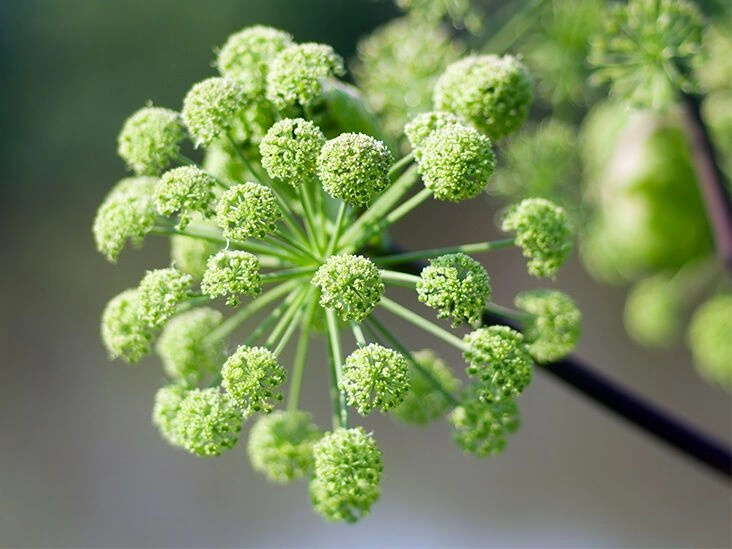Angelica is a group of herbs frequently employed in traditional healing systems, especially across Asia. The roots of several Angelica species are commonly processed into herbal remedies.
That said, the term angelica root most often denotes Angelica archangelica (A. archangelica), and it can also refer to Angelica sinensis (A. sinensis).
Both species’ roots and other parts have long been used in folk and herbal medicine, though A. sinensis has attracted more scientific investigation.
In traditional Chinese medicine, A. sinensis is used for a range of issues including hormonal regulation, digestive support, and liver health.
Conversely, A. archangelica has a history of use in Europe for digestive complaints, circulation problems, and anxiety relief.
Nevertheless, robust scientific proof supporting many of these applications for either species is limited.
This piece summarizes what angelica root is, contrasts A. archangelica and A. sinensis, describes their uses, outlines possible benefits and harms, and reviews typical dosing.

What is angelica root?
Members of the Angelica genus can reach heights up to 10 feet (3 meters) and produce spherical clusters of greenish or yellow blooms that develop into small yellow fruits.
They possess a pronounced, distinctive aroma produced by aromatic compounds. The fragrance is commonly characterized as musky, earthy, or herb-like.
A. sinensis, also called dong quai or “female ginseng,” is indigenous to China and other East Asian nations and is mainly used there for women’s hormonal concerns.
A. archangelica, often referred to as wild celery or Norwegian angelica, grows primarily in Europe and is used both culinarily and medicinally in some regions.
Although “angelica root” suggests only the root is utilized, many A. archangelica supplements and herbal preparations include roots, seeds, fruits, and/or flowers. Products containing A. sinensis are generally made exclusively from the plant’s root.
SummaryA. sinensis and A. archangelica are related plants. Typically, A. sinensis preparations use only the root, while many A. archangelica products incorporate the whole plant.
How they’re used
Angelica root, especially A. archangelica, has culinary applications. It’s sometimes used in the production of gin and other alcoholic beverages, and its leaves can be candied for garnishing.
More commonly, however, it is employed as an herbal therapy. It has a long tradition of medicinal use across Europe and Russia where it grows naturally.
Likewise, A. sinensis root is a mainstay of traditional Chinese medicine, largely for women’s health purposes.
SummaryA. sinensis is traditionally used for female hormonal concerns in Chinese medicine, while A. archangelica is used in parts of Europe both as an herbal treatment and in spirit production.
Benefits
Overall, high-quality scientific evidence supporting the benefits of angelica root — whether A. sinensis or A. archangelica — is scarce.
A. sinensis benefits
Many of the proposed effects of A. sinensis are attributed to ligustilide, a potent compound making up roughly 1% of the plant and responsible for much of its aroma.
Anticancer properties
In laboratory and animal research, A. sinensis extracts have been shown to destroy glioblastoma cells, an aggressive form of brain cancer.
That said, these results from test tubes and animals don’t demonstrate that taking an angelica supplement will eliminate brain cancer in people. Far more human research is required before A. sinensis could be considered a cancer therapy.
While these findings are an encouraging foundation for future study, follow the guidance of your medical team if you have cancer.
Wound healing
A. sinensis may support wound repair by stimulating angiogenesis, the growth of new blood vessels.
There’s preliminary evidence it might specifically enhance healing of diabetic foot ulcers, which often heal slowly due to blood vessel and tissue damage from elevated blood sugar.
Relief of menopausal hot flashes
One common traditional use of A. sinensis is to manage menopausal symptoms and other female hormone-related issues.
Interest in complementary treatments for menopause — for symptoms such as hot flashes and night sweats — is increasing as people seek natural options.
Some research suggests that reduced serotonin may contribute to hot flashes, and angelica root could help sustain or raise serotonin levels, potentially lowering hot flash frequency and intensity.
Still, there is limited high-quality evidence supporting A. sinensis for menopause relief and little data on long-term safety in menopausal women.
Arthritis relief
A. sinensis might protect against osteoarthritis (joint wear-and-tear) and rheumatoid arthritis (an inflammatory autoimmune joint disease).
Supplementation with A. sinensis may reduce inflammation, slow joint damage, and support cartilage repair in osteoarthritis models.
For rheumatoid arthritis, A. sinensis appears to dampen inflammatory reactions, which could reduce pain and improve some symptoms.
However, much of this work comes from lab and animal studies, so further human trials are necessary.
A. archangelica benefits
A. archangelica may also have beneficial effects, but research on this species is limited and largely conducted in vitro or in animals, serving only as preliminary evidence for future human research.
Anticancer properties
Like A. sinensis, A. archangelica shows certain anticancer and antitumor activities in lab and animal studies.
For instance, it has eradicated breast cancer cells in test-tube experiments and slowed tumor growth in mice, and it may affect cervical, laryngeal cancers, and rhabdomyosarcoma cells.
These actions are attributed to compounds such as angelicin and imperatorin present in A. archangelica.
Nonetheless, these findings don’t prove benefits in humans; additional studies are required. If you have cancer, adhere to the treatment plan from your healthcare provider.
Antimicrobial effects
A. archangelica may combat harmful bacteria, viruses, and fungi.
In vitro studies show A. archangelica essential oil can inhibit pathogens like Staphylococcus aureus and Escherichia coli.
Extracts and isolated compounds, including imperatorin, demonstrate antiviral activity against herpes simplex (cold sore) virus and coxsackievirus, which causes gastrointestinal illness.
The essential oil also shows promise as a food-safe preservative to limit mold growth, having inhibited mold on walnuts in laboratory testing.
Anti-anxiety effects
There is encouraging evidence from animal research that A. archangelica may reduce anxiety.
Three studies in rats reported that A. archangelica extracts produced calming effects and decreased anxiety-like behaviors in the animals.
However, these results have not yet been replicated in humans, so it’s unclear whether similar benefits would occur in people.
SummaryA. sinensis shows potential for wound healing, menopause symptom relief, and arthritis benefit. A. archangelica may offer antimicrobial and anti-anxiety effects. Both species can kill certain cancer cells in laboratory studies, but more human research is required.
Downsides
Angelica root, especially A. sinensis, can cause adverse effects and interact with medications. A. archangelica may have side effects as well, but it is less well-studied.
There are suspected reports of high-dose A. sinensis supplements causing cardiac issues. A. sinensis may also raise blood pressure.
A. sinensis can interact with anticoagulants such as warfarin, potentially increasing the risk of severe, even fatal, bleeding. If you are on blood thinners, do not use A. sinensis without discussing it with your clinician.
Plants in the Angelica group contain furanocoumarins — the same class of compounds in grapefruit that can interact with many medications, including certain cholesterol-lowering and anti-seizure drugs.
Consult your healthcare provider before using any Angelica product if you take medications that include a grapefruit interaction warning.
Also be aware that handling angelica can cause photodermatitis (an abnormal skin reaction to UV light) and contact dermatitis in some people.
Finally, because safety data are lacking for pregnant and breastfeeding women, avoid A. archangelica and A. sinensis if you are pregnant, planning pregnancy, or nursing.
SummaryA. sinensis may raise blood pressure, cause heart issues, and interact with blood thinners. Angelica species may also interact with drugs that have grapefruit warnings.
Dosage and precautions
Angelica root products are available as capsules, liquid extracts, and dried teas.
There is no universally accepted standard dose, nor clear guidance on a safe threshold to avoid adverse effects. Many supplements supply between 500–2,000 mg of powdered angelica root or extract per serving.
If you are taking anticoagulants or have existing heart disease or hypertension, avoid A. sinensis unless advised by your healthcare provider.
Don’t self-treat a medical condition with an Angelica-based product, as that might delay appropriate medical care and lead to harm.
Always consult your healthcare professional before using angelica for any health concern.
Purchasing angelica root
Check that the product you buy specifies which Angelica species it contains and matches the effects you want from supplementation.
Many products labeled “angelica root” do not indicate the species used.
Generally, dong quai supplements are made from A. sinensis, while products labeled angelica root often contain A. archangelica.
However, some A. sinensis products are marketed as angelica root, so to avoid confusion, purchase items that clearly list the species on the label.
SummaryNo standard dose exists. Most angelica supplements provide 500–2,000 mg per serving. Verify the label to ensure the species of Angelica is disclosed.
The bottom line
Angelica root is a traditional herbal remedy used historically in Europe and East Asia. The term can refer to either A. archangelica or A. sinensis.
Although many uses are reported for each species, reliable evidence is limited and largely confined to animal and laboratory studies.
If you’re considering angelica root, confirm that the supplement you choose contains the specific Angelica species you intend to use.


















Leave a Reply
You must be logged in to post a comment.